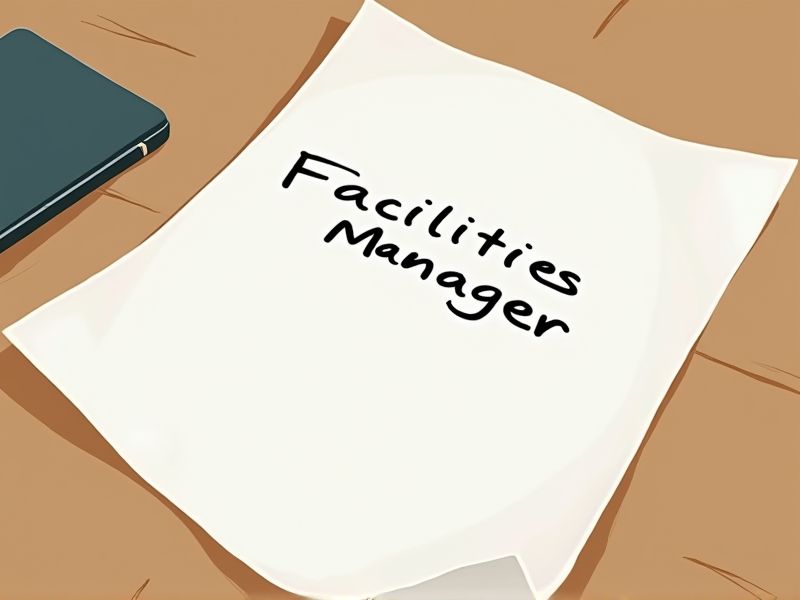
Facilities Managers need certain certifications to enhance their professional credibility and ensure the efficient operation of a facility. These credentials validate their expertise in key areas such as safety compliance, environmental management, and operational efficiency. Obtaining certifications can lead to improved job performance and career advancement opportunities. Here are some important certifications a Facilities Manager might require.
Certified Facility Manager (CFM)
A Certified Facility Manager (CFM) ensures a standardized level of expertise, reflecting a commitment to excellence and continual professional development. This certification validates a facility manager's knowledge across key areas like operations, maintenance, and risk management, fostering trust among stakeholders. Employers often prefer CFMs as they bring proven skills, potentially reducing facility-related inefficiencies and costs. The credential signifies a facility manager's dedication to staying current with industry trends and regulatory requirements.
Facility Management Professional (FMP)
Facility management professionals (FMPs) bring specialized knowledge that enhances operational efficiency, reducing costs and increasing productivity. Their expertise in regulatory compliance ensures facilities meet legal standards, mitigating risks and liabilities. FMPs possess skills in strategic planning, enabling facilities to adapt to changing business needs and technological advancements. Effective communication and stakeholder management by FMPs improve collaboration, leading to a more cohesive work environment.
Real Property Administrator (RPA)
Having a Real Property Administrator (RPA) leads to increased operational efficiency in managing real estate assets. RPAs offer specialized knowledge in lease administration and property management, which crucially reduces operational costs. Their expertise enhances tenant satisfaction as they ensure properties are well-maintained and compliant with regulations. Effective management by an RPA supports strategic planning and investment in property portfolios, visibly increasing asset value.
LEED Accredited Professional (LEED AP)
A LEED Accredited Professional enhances a facilities manager's expertise in sustainable building practices, impacting energy efficiency and resource management positively. Facilities with LEED certification often experience reduced operational costs, due to strategies that prioritize sustainability and efficiency. LEED AP credentials can attract environmentally conscious tenants or investors by validating a facility's commitment to sustainability. Having a LEED AP can help in navigating complex regulations and incentive programs associated with sustainable building initiatives.
Certified Energy Manager (CEM)
A Certified Energy Manager (CEM) is essential for a Facilities Manager because it ensures energy efficiency and cost savings, which positively affects a company's bottom line. The expertise of a CEM helps in identifying inefficiencies and implementing solutions that reduce energy consumption, leading to environmental and financial benefits. With regulations and sustainability goals becoming more stringent, a CEM provides the necessary knowledge to keep facilities compliant with industry standards. Having a CEM on the team demonstrates a commitment to best practices in energy management, which can enhance the organization's reputation and operational efficiency.
Project Management Professional (PMP)
The PMP certification equips facilities managers with enhanced project planning and execution skills, which directly improve project outcomes. By understanding project management methodologies, facilities managers can effectively manage resources, timelines, and budgets, reducing the risk of costly overruns. The certification also signals to employers and stakeholders that the manager possesses a high level of professionalism and competency, which can lead to career advancement opportunities. Comprehensive risk assessment and mitigation strategies learned during PMP training help facilities managers to anticipate challenges, ensuring projects remain on track.
Certified Healthcare Facility Manager (CHFM)
Certified Healthcare Facility Managers (CHFM) enhance the safety and efficiency standards within healthcare institutions, directly contributing to improved patient care. Their specialized training equips them to address unique regulatory compliance requirements, mitigating potential legal and operational risks. By integrating best practices and innovations, they optimize facility operations, leading to cost reduction and resource efficiency. Their proficiency in healthcare-specific challenges supports more strategic long-term planning and infrastructure modernization.
OSHA 30-Hour Construction Safety and Health Certification
OSHA 30-Hour Construction Safety and Health Certification equips facilities managers with vital knowledge about risk identification and mitigation, thereby reducing workplace accidents. Training boosts compliance with federal safety regulations, avoiding hefty penalties for organizations. Understanding safety protocols enhances a facilities manager's ability to foster a secure work environment, leading to increased employee productivity. Investing in this certification often results in long-term cost savings by minimizing disruptions associated with workplace injuries.
Commissioning Process Management Professional (CPMP)
The Commissioning Process Management Professional (CPMP) certification helps Facilities Managers ensure that building systems operate as intended, leading to improved energy efficiency and reduced operational costs. Facilities Managers with CPMP can identify and mitigate potential system failures before they escalate, thereby minimizing downtime and maintenance expenses. The standardized processes and procedures learned through CPMP enhance the Facilities Manager's ability to deliver projects on time and within budget. CPMP-certified managers tend to foster more reliable communication and collaboration among stakeholders, resulting in a smoother project handover and better end-user satisfaction.
Sustainability Facility Professional (SFP)
Facility Managers face increasing pressure to reduce environmental impact, and SFP certification equips them with the knowledge to implement sustainable practices. Energy costs are a significant operational expense, and SFPs learn to manage resources more efficiently, leading to cost savings. Regulatory environments are constantly evolving, and SFPs stay informed about compliance with environmental standards and regulations. Organizations are increasingly expecting corporate sustainability, and having an SFP credential can enhance a facility manager's value and credibility in promoting these initiatives.
Summary
When you, as a Facilities Manager, attain certifications, your expertise and industry knowledge can significantly improve. This enhancement might lead to increased job performance and operational efficiencies within the facilities you manage. Such qualifications often result in enhanced credibility and trust among colleagues and stakeholders. Most likely, a certified Facilities Manager could enjoy better career advancement opportunities and possibly higher salary prospects.
